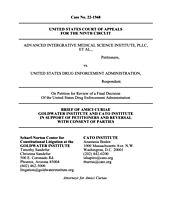Learn more about Cato’s Amicus Briefs Program.
A lot has changed in psilocybin research in recent years. In 2018 and 2019, the FDA designated two psilocybin trials as “breakthrough therapies” for treating severe depression. Breakthrough‐therapy status can be granted by the FDA when a new drug shows significant improvement over currently available alternatives. Psilocybin has been particularly effective at treating the understandable depression suffered by terminally ill patients.
But psilocybin (the psychedelic substance found in so-called “magic mushrooms”) is a Schedule I drug under the Controlled Substances Act (CSA), meaning that it has no currently accepted medical uses and has a high potential for abuse. In that way, psilocybin is like medical marijuana—also a Schedule I drug. The difference is that the DEA is allowing medical marijuana to be used all over the country.
This case is about the interaction of the CSA, the FDA, and federal and state right to try laws. The federal right to try law, passed in 2018, allows “the use of unapproved medical products by patients diagnosed with a terminal illness in accordance with State law.” Additionally, 41 states have right to try laws. That includes Washington State, whose right to try law is at issue in this case.
When a medical clinic sought guidance from the DEA on how it could obtain psilocybin for its terminally ill patients, the DEA responded with a cursory statement that it had “no authority to waive” the requirements of the CSA in order to accommodate right to try laws. But in fact, the DEA has broad authority under the CSA to make exceptions and exemptions. For example, the agency has long permitted the religious use of peyote by certain Native American religions. And until 1992, if someone could demonstrate a medical need, the DEA not only allowed some people to smoke marijuana, but the federal government actually supplied the drug.
Moreover, Congress was aware that the CSA and the Federal Food, Drug, and Cosmetics Act (FDCA)—into which the right to try section was added in 2018—would sometimes clash. Thus, the Controlled Substance Act explicitly says that “[n]othing in [the CSA] … shall be construed as in any way affecting, modifying, repealing, or superseding the provisions of the [FDCA].” The DEA’s decision that it has “no authority to waive” parts of the CSA doesn’t stand up to scrutiny.
The clinic has appealed the denial of its request, and Cato has joined the Goldwater Institute to file an amicus brief arguing that the DEA failed to properly take into account the federal and state right to try laws. Right to try laws were adopted out of a concern that the federal government has increasingly and improperly interfered with the practice of medicine—quintessentially a matter of state law—by prohibiting doctors from treating patients to the best of their ability and with the full extent of their knowledge, just as the clinic seeks to do here.
State right to try laws protect the most personal and intimate right of all: the right to one’s own life. And the Supreme Court has ruled that states have “great latitude … to legislate as to the protection of the lives, limbs, health, comfort, and quiet of all persons.” That was in a 2006 case called Gonzales v. Oregon, in which the Court ruled that the federal government could not use the CSA to prosecute Oregon physicians who administered euthanasia drugs to patients under the state’s assisted‐suicide law.
Under our constitutional system, states have the primary role in regulating the medical profession. States that have passed right to try laws have institutionalized the principle that compassionate use should be the rule, not the exception, for terminal patients. The DEA’s refusal to accommodate right to try needlessly undercuts this goal and the state laws that safeguard this autonomy for patients.

This work is licensed under a Creative Commons Attribution-NonCommercial-ShareAlike 4.0 International License.


